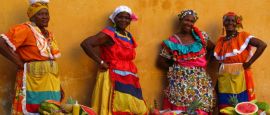Colombia Health Care and Vaccinations
| Title | Special precautions |
|---|---|
| Diphtheria |
Sometimes |
| Hepatitis A |
Yes |
| Malaria |
Sometimes |
| Rabies |
Sometimes |
| Tetanus |
Yes |
| Typhoid |
Sometimes |
| Yellow Fever |
Sometimes* |
Although cases of Zika infection in Colombia have dropped dramatically since the initial outbreak in 2015, there is still has a high risk of infection within the country and all travellers are advised to practice strict mosquito bite avoidance at all times.
The World Health Organisation recommends travellers to Colombia protect themselves from mosquito bites by wearing light-coloured clothes that cover as much of the body as possible, sleeping under mosquito nets and using repellents that contain DEET (diethyltoluamide), IR 3535 ((3- [N-butyl-N-acetyl], aminopropionic acid ethyl-ester) or KBR3023 (also called Icaridin or Picaridin). Pregnant women are advised to postpone non-essential travel until after pregnancy and pregnant women whose sexual partners live in or travel to areas with Zika virus transmission should follow safe sexual practices or abstain from sex for the duration of their pregnancy. Women who are pregnant, at risk of getting pregnant, or planning pregnancy should seek further advice from their doctor before travelling to Colombia.
Health facilities in the main cities are good, and pharmacies stock most drugs at prices that tend to be lower than in the UK or USA. In rural areas, medical services can be very limited and travellers who become ill in remote areas should try to get to a city as soon as possible to be treated. Visitors travelling to jungle areas are advised to carry first aid kits, including antibacterial ointment and coverings for wounds which can become easily infected and not heal well in the humidity. When travelling to the coast or jungle areas, travellers should take DEET-containing insect repellent in order to avoid any mosquito-borne illnesses. Travellers are strongly advised to take out full medical insurance – Colombia has many adventurous activities on offer and you should ensure that your travel insurance covers you for all of them.
All water should be regarded as being potentially contaminated outside major cities. Water used for drinking, brushing teeth or making ice should have first been boiled or otherwise sterilised. Bottled water is widely available throughout the country however, including in rural towns, so you can always make sure you have some. Milk may be unpasteurised in places and should be boiled.
Only eat well cooked meat and fish. When buying food from stalls or markets, try to ensure that the food has not been sitting there for a while, and is kept hot enough to kill germs. Vegetables should be cooked and fruit peeled. There is an abundance of fruit available throughout Colombia, which includes pre-cut fruit put into bags and sold on beaches or from stalls in tourist areas. Buying whole fruit from the markets is both cheaper and more hygienic, and will help avoid contamination.
Vaccination against hepatitis B is sometimes recommended, especially for those spending long periods of time in Colombia or anyone who could have sexual relations with the local population. Hepatitis C occurs. Outbreaks of dengue fever sometimes occur, particularly in areas along the Caribbean coast and in the Chocó, Antioquia, Córdoba, Sucre, Bolivar and Atlántico departments.
Take care when going from sea level to high altitude – if you’re sensitive to it, don’t go on any major hikes the first day you arrive in Bogotá. Allow several days to acclimatise to altitudes over 2,500m (8,200ft). Initial symptoms include headaches, breathlessness (especially when walking up hills), dizziness and nausea. This should pass within 72 hours.
Do you have any Feedback about this page?
© 2026 Columbus Travel Media Ltd. All rights reserved. No part of this site may be reproduced without our written permission, click here for information on Columbus Content Solutions.








 You know where
You know where